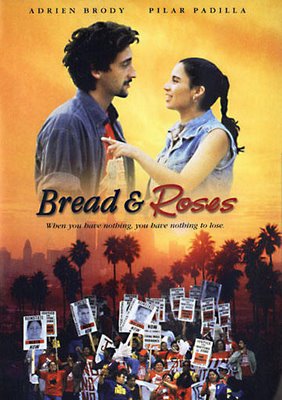
BREAD AND ROSES
UK, 2000, 110 minutes, Colour.
Pilar Padilla, Adrien Brody, Elpidia Carrillo.
Directed by Ken Loach.
Bread and Roses is Ken Loach’s only film to be made in the United States. During the 1990s he made Carla’s song which was filmed in both Scotland and Nicaragua.
The film is very much in the vein of Loach’s political films. It focuses on illegal immigrants into California, their hardships, their being exploited, their getting poor jobs especially as poorly-paid janitors in skyscrapers in Los Angeles.
The film was based on fact, demonstrations and protests by the janitors in 1990 (with footage from these demonstrations as well as some of the janitors themselves acting as extras in the film). The film focuses on a young woman, Maya, who slips into the United States, is exploited by the migrant merchants, escapes, lives with her sister, gets a job as a janitor. She is played by Pilar Padilla – a very persuasive and credible performance. Elpidia Carrillo is her sister. The high point of the film is a confrontation between the two sisters: Maya accuses Rosa of betraying the union protests to the authorities and to the police. Rosa then gives the background to her time in America, her having to act as a prostitute to send money back to the starving family in Mexico. It is a fine dramatic sequence.
Adrien Brody, who had appeared in The Thin Red Line, is the chief organiser for the unionists. He was soon to appear in Roman Polanski’s The Pianist and win an Oscar for best actor in 2002. He has appeared in The Jacket, Hollywood Land, The Village.
Ken Loach has directed hard-hitting social-themed films for four decades. Highlights of his career include Kes, Family Life, Ladybird Ladybird, Raining Stones, Riff-Raff?, Land and Freedom, My Name Is Joe, The Wind That Shakes The Barley.
1. The impact of the film? Ken Loach and his social concern, justice, causes? The critique of capitalism? Support of the unions?
2. Loach in the US? His Scottish screenwriter, Paul Laverty, the British perspective to these American situations? Their critique, their insights?
3. The film as factual, illegal immigration, the status of the illegals, their being used, their lack of rights, the exploitation, the janitors’ protest in 1990, the TV footage shown?
4. Los Angeles and its neighbourhoods, downtown, the poor homes, Century City, the streets, authentic? The musical score and songs? The prologue: the Mexicans getting across the border, their having to hide, the dark of night, herded into the van? The different types? The managers, their taking the money, delivering the migrants? The sexual exploitation? Maya and her escape?
5. Maya in herself, having to migrate, leaving the family behind in Mexico? Relying on Rosa? Rosa not being able to pay the demands, the sexual harassment, Maya’s escape? Her job, working as a janitor, her friendship with the other workers, the details of work, life? Her friend Ben and his wanting a scholarship? At home, the social life, songs and dances, her brother-in-law and his collapse? Rosa having to care for him, payments? Perez at the building, his harshness, firing people? Sam and his assistant, their speeches? The Russian woman and her fears? Agreement with Sam, the demonstrations, Perez and his conferring with the authorities? The threats, the bribes for the woman to give information? The demonstrations? The rights, the charter, Perez not understanding it? The right to free time, eating? Maya at home, with Sam, the attraction, the party, the kiss? The discussions with Ben, his love for her, her not being able to love him? The build-up to their demonstration, the plan, the party, the intrusion? The guests? The final demonstration in the streets, Rosa betraying them? The attack of the police? Maya and her confronting Rosa, the dramatic impact of their argument, Maya and her grief in learning of what Rosa had to put up with? Her going to jail, her stealing the money from the service station, the fingerprint, the interrogation, in the cell? Winning the case, her being returned to Mexico, her being dealt with leniently, looking out the back of the bus at Rosa?
6. Sam, white and affluent, his job, his assistant? The company and his employment, arguing with his friend? The meetings, his speeches, his drawing – and his carelessly throwing it away and its being given to Perez? The issues of justice, firing, unionism? The demonstrations, his going to the restaurant, confronting the capitalist, eating his food? The plan for the party, infiltrating, his speech? The reaction of the guests? The final demonstration, the attack of the police, being in jail, winning? The attraction towards Maya? Her going back to Mexico?
7. The janitors, their lives, the men and the women, especially the women, their age, experience, poor wages, needing the money to survive? The hard work? Security and their jobs? The bonds between them? The Latin Americans? The Russian woman and her being an outsider?
8. The bosses, the ownership of the buildings, management, relying on authorities like Perez, his demands, brutality, sexual exploitation of Rosa for Maya’s job? The demonstrations, the party, the guest film stars and their presence supporting Loach? The speeches?
9. Rosa, her welcoming Maya, her husband, the children? Life in Los Angeles, her husband’s collapse? Hospital? The build-up to the scene between the two, Rosa and her point of view, giving the information? Her telling Maya the truth about her life in Los Angeles?
10. The ending, the janitors in jail, the phone calls and the winning of the case, the payments? Getting out? Maya in the bus, Rosa following?
11. The illustration of political and justice themes via story rather than preaching?